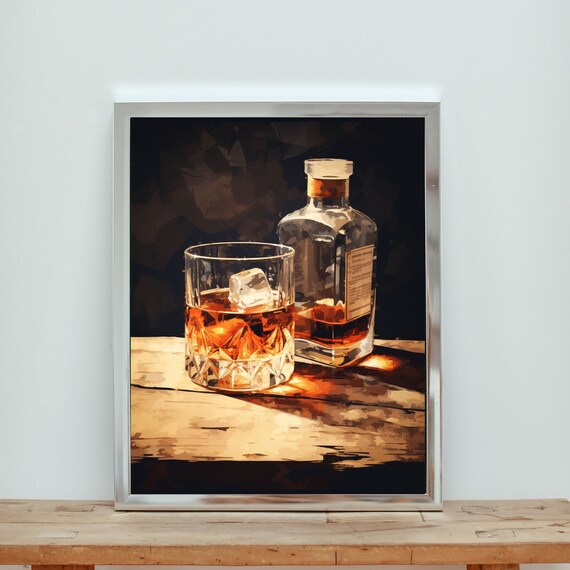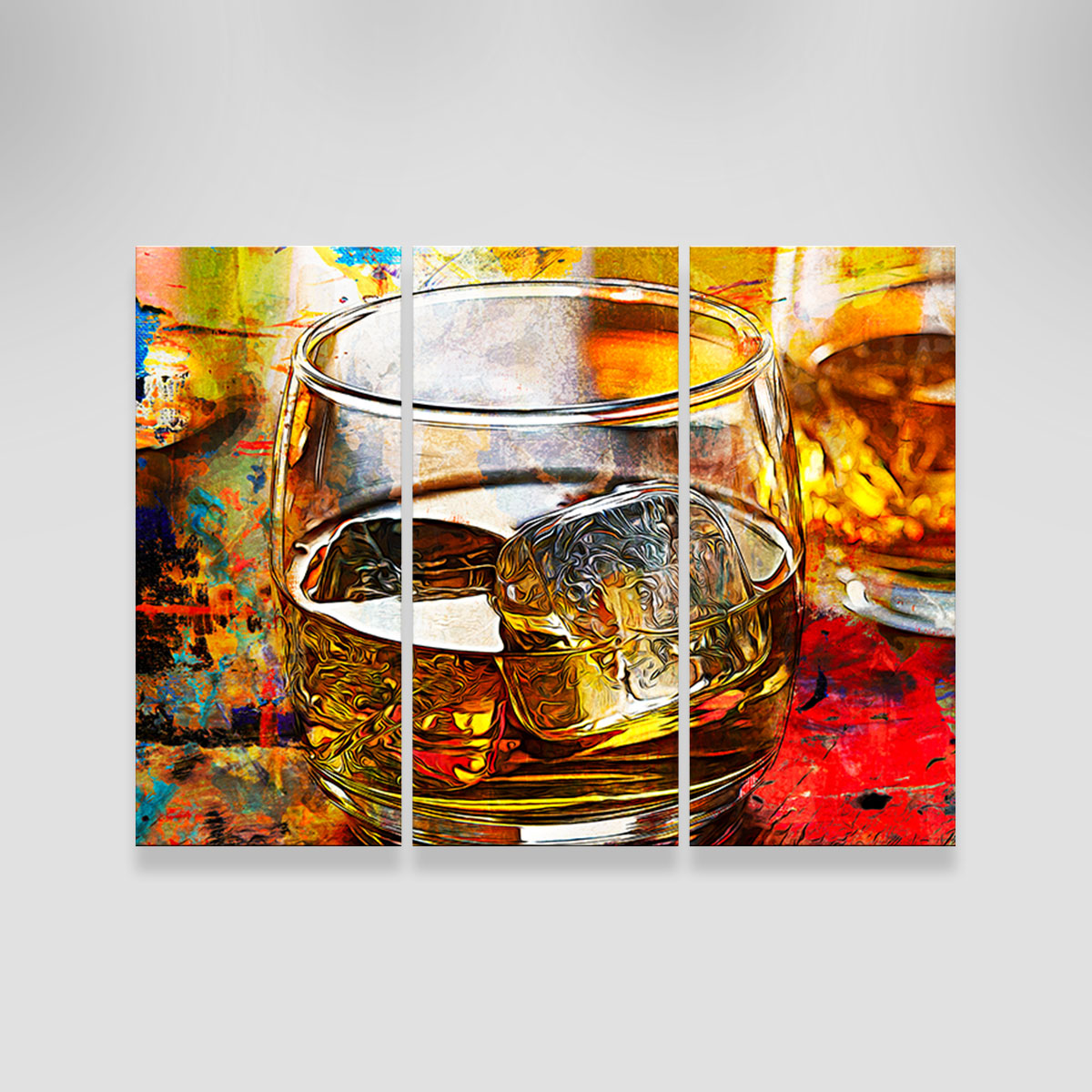Whiskey Art as a Declaration: Just How It Improves Home Decoration
Catching the Essence of Scotch Art Via Unique Visual Representations and Styles
The art of scotch extends past the fluid itself, materializing through a selection of aesthetic representations that envelop its storied heritage and workmanship. What stays to be discovered is how these evolving designs show not only the bourbon itself however also the transforming landscape of creative interpretation. Bourbon Art.
The Background of Whiskey Art

As scotch production spread, so as well did the desire to boost its experience with art. From the intricate inscriptions on early barrels to the elaborate tags of modern containers, each element shows an unique imaginative vision, functioning as an aesthetic narrative of the scotch's heritage.
In the 19th and 18th centuries, the increase of the commercial revolution additionally enhanced scotch art, leading to ingenious packaging and advertising that caught customer attention. Developers and musicians began exploring with aesthetics, imbuing whiskey-related images with symbolic definitions that conveyed concepts of craftsmanship, community, and custom.
Today, whiskey art remains to develop, mixing typical approaches with contemporary art forms. Whiskey Art. This continuous discussion in between the spirit and its graph emphasizes the long-lasting bond in between scotch and society, improving the total experience for fanatics worldwide
Iconic Container Layouts
While lots of variables add to the attraction of bourbon, famous container styles play an essential function in shaping consumer understanding and enhancing the overall experience. The visual discussion of scotch bottles is not just a visual factor to consider; it functions as a bridge between the product and the consumer, evoking emotions and setting assumptions.
Unique shapes, products, and closures can boost a bourbon brand's identification, making it instantly recognizable on crowded shelves. As an example, the timeless Glenfiddich bottle, with its stylish tapered shape, communicates a sense of practice and workmanship, while the bold, modern layout of the Balvenie bottle reflects technology and class. Furthermore, the usage of colored glass or one-of-a-kind structures can recommend the quality and personality of the whiskey within.
Iconic styles often integrate components of cultural heritage, signifying the brand name's history and link to its origins. Brands like Jack Daniel's use a straightforward, robust layout that resonates with its American whiskey heritage. Eventually, the influence of bottle design prolongs past plain functionality; it encapsulates the significance of the brand, inviting consumers to check out and indulge in the abundant tapestry of bourbon society.
Label Artwork and Branding
Bottle layouts usually establish the phase of what consumers can anticipate, yet label artwork and branding play an equally substantial function in interacting a whiskey's identification. The tag functions as the first factor of get in touch with between the product and the customer, enveloping the essence of the bourbon within its visual elements.
Reliable label art work integrates typography, images, and color to create a story that resonates with the brand name's heritage and target audience. For instance, a tag featuring complex illustrations and classic font styles may evoke a sense of practice and craftsmanship, appealing to lovers. In contrast, vibrant shades and contemporary style aspects may attract a younger market looking for advancement and excitement.


Digital Photography and Visual Narration
Capturing the significance of whiskey through photography and aesthetic storytelling is an art kind that boosts the brand name experience. This my sources medium goes beyond simple product depiction, diving into the detailed narratives that border each bottle. By using compelling images, professional photographers can evoke emotions that reverberate with consumers, inevitably forging a much deeper connection to the scotch brand name.
Visual narration in whiskey digital photography typically utilizes rich appearances, lighting, and make-up to highlight the distinct features of the spirit. The interplay of light and shadow can emphasize the amber shades of bourbon, while the choice of background components-- such as rustic barrels or elegant glasses-- can enhance the brand's heritage or way of life organizations.
Moreover, capturing the ritualistic facets of bourbon consumption, from the pouring to the tasting, welcomes visitors right into a sensory experience, allowing them to think of the tastes and fragrances that wait for. Each photograph not only showcases the product however likewise informs a tale of workmanship, practice, and the moments that whiskey can enhance - Whiskey Art. Hence, digital click here to find out more photography becomes a powerful tool in articulating the identity of whiskey brand names, placing them within the more comprehensive social landscape
Emerging Fads in Scotch Art
The evolution of scotch art is progressively shaped by contemporary trends that reflect broader societal shifts and consumer preferences. One prominent fad is the assimilation of sustainability right into art techniques. Musicians are now using recycled materials and environmentally friendly processes to produce whiskey-themed pieces, resonating with eco aware consumers. This shift not just highlights the relevance of sustainability however also enhances the story surrounding whiskey manufacturing.
Furthermore, digital art has actually surged in appeal, permitting cutting-edge depictions of whiskey. Musicians are leveraging modern technology to craft immersive experiences, such as enhanced reality setups that engage customers and offer a much deeper understanding of scotch's social importance. This fad also reaches social networks systems, where visually striking material garners interest and cultivates community amongst lovers.
In addition, collaborations in between bourbon brands and musicians are becoming extra typical. These partnerships generate limited-edition packaging styles and special art work that celebrate both the craftsmanship of scotch and the creative thinking of musicians. As whiskey art continues to progress, these arising trends will definitely form its future, fostering a dynamic crossway of society, sustainability, and modern technology within the bourbon community.
Conclusion
Finally, the art of scotch incorporates a varied array of visual depictions that mirror its abundant heritage and workmanship. From legendary container layouts and intricate tag artwork to engaging digital photography, each component adds to a more comprehensive story that boosts the customer's experience. As arising patterns, such as digital art and sustainability, continue to shape this artistic landscape, the multifaceted identity of whiskey remains an enduring source of social link and expedition.

In final thought, the art of whiskey incorporates a varied range of visual depictions that show its rich heritage and workmanship.